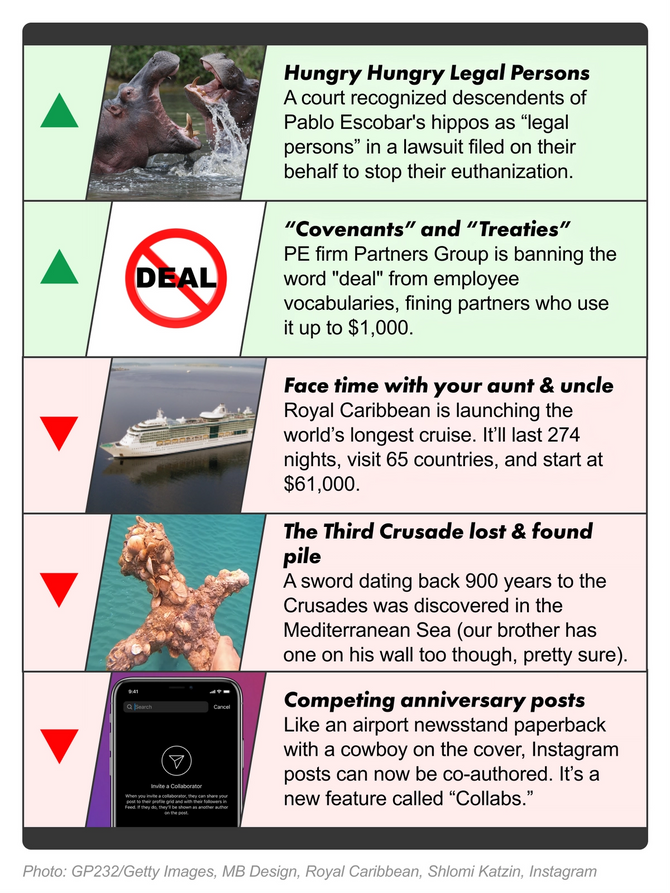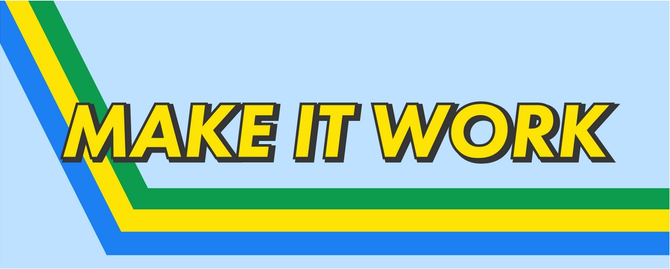|
|
|
|
|
|

Mojo Wang
|
|
IN THIS ISSUE
|
Jasmine Crow wants to solve hunger
|
An organ transplant breakthrough
|
When the work week bleeds into Saturday
|
|
|
|
Good morning. I’m not sure we need a sequel to The Odyssey, but if you’re reading this, Homer, I humbly submit the story of the Olympians from the Cook Islands, a nation of 15 islands in the South Pacific.
You see, these Cook Islands athletes returned home last week from the Olympics. Yes, those Olympics. The Games that took place in Tokyo and ended all the way back in early August.
As the Olympics wound down, the Cook Islands team left Japan and arrived in Christchurch, New Zealand, where they quarantined for two weeks. Then, they traveled to Auckland, NZ—the last stop before home.
Covid had other plans, and as they entered Auckland, the city went into lockdown for two months, stranding the Olympians. When the lockdown lifted, they finally were allowed to return to the Cook Islands...exactly 13 weeks and three days after they first left for Japan.
Oh, I forgot one other detail. The weary travelers are currently quarantining in a hotel for two weeks upon arriving in the Cook Islands. “If I can get through 14 days [of quarantine] in Christchurch then eight weeks in lockdown, I can handle it,” the country’s Olympic committee president Hugh Graham said.
—Neal Freyman
|
|
|
|
|
|
|
|
|
Jasmine Crowe
Jasmine Crowe wants to solve hunger. So in 2017, she founded Goodr, an Atlanta-based food waste management company that connects restaurants and businesses with leftover food to nonprofits that help feed people experiencing food insecurity. She’s also a speaker, children’s book author (!), and a Jay-Z super fan.
We chatted with Jasmine about how she built Goodr and her peachy hometown.
What inspired you to start Goodr?
What really opened my eyes was realizing businesses were already paying waste companies to throw perfectly good food away when that food could be going to somebody in need.
What’s one thing you wish you knew when you first started pitching Goodr to investors?
When I started raising funding, the first million that I raised, I must have taken well over 200 meetings. I wish I knew then that investors don't care about fighting hunger or food waste. And I went into meetings pitching that so hard because I thought, “Hey, I have this world-changing idea. We're solving hunger.” I wish I knew that investors only care about money. Even if they're a social impact investor, money is still what drives them. I was a little naive to that.
Besides fundraising, what other hurdles have you faced in the early days of Goodr?
Building a team can be an early challenge in any startup. I'm still competing against Twitter and the Ubers of the world for employees. And they have endless money.
How do you build a successful team as a startup?
What I would definitely advise against is just hiring your friends and family. It costs a lot of money and it takes a lot of time for training. So hire the best people, even if it takes you a long time to find that person. It’s really worth it in the end.
Also, in the beginning, I had people who weren't working out and I was keeping them on while knowing they were not the best fit. And in hindsight, I wish I had let them go faster so that they could follow their passion. And then it would have allowed me to find somebody else.
What is the best thing about Atlanta?
The people and the culture. It's tough to pick just one. Atlanta is a community and the people have really supported me. One of my first customers ever was the Atlanta airport—that's one of the world's busiest airports. And they embraced the fact that I was a startup in Atlanta.
When I was first raising money, investors acted like Atlanta was the worst place ever. But there are a lot of great startups here that I think are going to make a lot of change.
If you want to hear more of Jasmine’s story, you can listen (that’s right, no reading at all!) to her interview on our podcast, Business Casual.
This interview has been edited and condensed for clarity.
|
|
|
|
|
|
Why invest yourself when you could join the platform letting some of the brightest analysts in the world manage your money for you? The answer: you shouldn’t.
The solution: Titan. It’s the platform bringing you premiere investment management previously reserved for the high net worth. You'll own a concentrated portfolio of stocks managed by Titan's award-winning investment team, and feel confident in your investment thesis for each.
With Titan, you can do better than just ETFs and mutual funds (we’re lookin’ at you, Boomers).
They just launched Titan Crypto. It’s the first actively managed crypto portfolio for everyday US investors. Keeping up with crypto can feel like a full-time job, which is why you’ll have their team of experts managing your crypto portfolio for you.
Get started with Titan today.
|
|
|
|
Each week, our workplace whisperer Shane Loughnane answers a reader-submitted question about work in 2021. Anything bothering you at work? Ask Shane here.
My boss expects me to work over the weekend. I have done so since I joined a few months ago (and some colleagues are working over the weekends too). But now I feel exhausted and want my weekend back. How should I tell him? —Miss Anonymous, NY
Assuming you’ve already left the results of Iceland's shortened work week experiment lying around the breakroom, it’s probably time to lean into a more direct approach. The fact that you are “expected” to work weekends, and that other colleagues are in the same boat, suggests this is likely part of the broader existing culture at the company. If that’s not something that was communicated during the hiring process, it’s worth giving your boss that feedback and asking to understand the disconnect.
Even if #nodaysoff was something you initially signed up for, that doesn’t mean you aren’t allowed to feel differently now. This is an ideal spot to pull up and discuss how things are going in all areas, specific to your work-life balance or otherwise. If M–F is coming up aces and your only gripe is finding that off-switch come Saturday, you might be more inclined to work toward a compromise—availability only on certain weekends, compensatory time off during the week, etc. If this is just one of several red flags, though, you’ll want to weigh all the evidence and consider if the job is still a good fit.
Either way, this is ultimately about you and what you’re willing to commit to going forward. Your continued exhaustion is unlikely to produce satisfying long-term results, personally or professionally, and so you owe it to yourself (and your boss) to address the situation head on. The more you can frame the goal as an opportunity to recalibrate boundaries for the mutual benefit of both parties, the better the conversation is likely to go.
Good luck—and if by chance you decide to escape to the land of fire, ice, and 3-day weekends, be sure to save me a seat on the plane.
Have a question about work you want to ask Shane? Write in here. And for more analysis on the modern workplace, make sure you sign up for HR Brew.
|
|
|
Pikrepo
Twelve people die on organ transplant waiting lists each day due to a severe shortage of available human organs. A recent medical breakthrough could make supply concerns a thing of the past.
A team of surgeons in NYC announced this week that they successfully attached a kidney from a genetically altered pig to a human body. And while kidney transplants from deceased humans can often take days or weeks to kick into gear, the pig kidney started working right away.
It’s the first time this operation has ever been accomplished.
The details: The surgeons, working at NYU Langone Health, externally attached a pig kidney to a brain-dead human patient who was being kept alive by a ventilator. The patient, whose family approved of the procedure, was observed for more than two days, and scientists found the pig kidney worked just as intended by filtering waste and producing urine.
It’s been a long time coming
Scientists have been trying to achieve xenotransplantation—animal to human transplants—5ever.
- In 1667, the physician to King Louis XIV transfused blood from a sheep to two people, both of whom survived.
- The most famous xenotransplantation effort was in 1983, when “Baby Fae,” an infant born with a heart defect, was given a baboon heart. She managed to survive for 21 days, weeks longer than anyone had survived after receiving a non-human heart.
Now, pig heart valves, pancreas cells, and skin grafts are used for human patients.
But organs are another story. The biggest challenge scientists have faced with pig organs transplanted into humans is that pig cells contain a specific sugar that human bodies reject immediately. For this procedure, scientists genetically engineered the pig to remove the gene that encodes that sugar molecule. It seemed to work.
Why it matters: Pig organs could create a sustainable solution to the backlog of 90,000+ people in the US waiting for a new kidney.
- That doesn’t even include the half a million people on dialysis who don’t qualify for a kidney transplant because of the extreme shortage.
Dr. Robert Montgomery, the director of the NYU Langone Transplant Institute, said pig organs could potentially be “the solar and wind of organ availability.”
Looking ahead...the breakthrough is exciting, but there are a few caveats: 1) It hasn’t yet been peer-reviewed or published in a journal 2) The patient was observed for just 54 hours, so the long-term effects of the organ transplant aren’t known and 3) you can imagine all the regulatory hurdles this type of procedure has to overcome in order to be used regularly.
Still, it’s an unquestionably good outcome.—MM
|
|
|
|
|
|
Don’t be part of the 47%. That’s the percentage of organizations that saw an increase in cyber attacks in the past year, and attackers have gotten smarter than your typical typo-laden spam emails. Good news: There’s a comprehensive security solution for that. Citrix has made groundbreaking advancements in intelligent and adaptive security to protect your hybrid workplace from today's biggest threats. Learn more here.
|
|
|
|
Welcome to Open House, the only newsletter section that wants you to dig deep and ask, “Do I really want that flat of a roof?” We’ll give you a few facts about a listing and you try to guess the price.
 Zillow Today’s house is in Prospect Heights, IL, a suburb northwest of Chicago. The burb was the childhood hometown of YouTube cofounder Steve Chen and that’s kind of its only fun fact. This mid-century home may be a little over an hour’s drive to The Bean, but it has 6,800 square feet of outdated wood flooring and shag carpet to make up for it. Amenities include:
- 5 beds, 4 baths
- Astro Turfed sunroom
- Medieval basement that’s big enough for a feast after your boar hunt
- Ideal party yard
How much for a truly outdated house?
|
|
|
1. The reclusive dictator behind a climate catastrophe. (Bloomberg)
2. What Uranus scientists think about your disgusting jokes. (Futurism)
3. Where does burnout come from? A former professor has answers. (HR Brew)
4. The unreleased Anime that almost changed history. (hazel)
5. Why birds can fly over Mt. Everest. (Nautilus)
6. The animals that may exist in a million years, imagined by biologists. (Vox)
7. The new fear and greed. (The Reformed Broker)
8. How Westarctica went from a wacky internet joke into a serious climate change non-profit. (Afar)
9. The science behind the health benefits of houseplants. (Just One Thing)
10. Human history gets a rewrite. (The Atlantic)
Sharp like jeans, comfy like sweats. Revtown was founded by former Under Armour execs who put their knowledge of athletic apparel to good use—making comfortable, stylish jeans that don’t take forever to break in. Get your stretchy but strong jeans here.*
*This is sponsored advertising content
|
|
|
Welcome back to Morning Brew's Meme Battle, where we crown a single memelord every Sunday.
Today's winner: Joe S in Portland, OR, understood the assignment.
 This week's challenge: You can find the special Halloween-themed template here for next Sunday. Once you're done making your meme, submit it at this link for consideration.
|
|
|
|
|
|
|
|
|

|
Written by Neal Freyman, Max Knoblauch, Jamie Wilde, Matty Merritt, and Shane Loughnane
Was this email forwarded to you? Sign up
here
WANT MORE BREW?
Industry news, with a sense of humor →
Tips for smarter living →
 Podcasts →
Business Casual
and
Founder's Journal
Podcasts →
Business Casual
and
Founder's Journal
Accelerate Your Career →
-
MB/A: virtual 8-week program designed to broaden your skill set
|
ADVERTISE
//
CAREERS
//
SHOP
//
FAQ
Update your email preferences or unsubscribe
here.
View our privacy policy
here.
Copyright © 2021 Morning Brew. All rights reserved.
22 W 19th St, 8th Floor, New York, NY 10011
|
|
|












